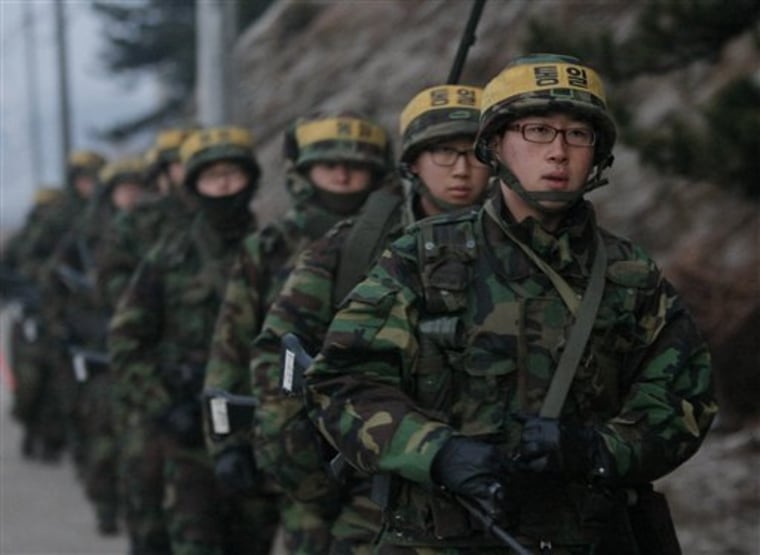A destroyer prowled the sea and fighter jets screamed across the skies Tuesday as South Korea braced for possible North Korean surprise attacks a day after launching provocative artillery drills on an island the North shelled last month.
North Korea has so far backed off threats to strike the South again for the live-fire military drills on Yeonpyeong Island, a tiny enclave of fishing communities and military bases within sight of North Korean shores.
Similar drills last month triggered a North Korean artillery barrage that killed four South Koreans, including two construction workers, in the first attack targeting civilian areas since the 1950-53 Korean War.
Top officials defended South Korea's decision to carry out the drills despite calls in some quarters for restraint, and said South Korea's military was prepared for any future North Korean provocation.
South Korean President Lee Myung-bak, in the wake of intense criticism over his handling of last month's attack, gathered his national security leaders for strategic talks. Lee was slammed for responding too slowly and too weakly to the original attacks, and his government has since threatened airstrikes if hit again, ordered more troops on front-line islands and revamped rules of engagement to allow for a more forceful response to future provocations.
"We will mobilize reconnaissance and surveillance assets of South Korea and the U.S. combined force and intensively monitor North Korea's military activities," Defense Minister Kim Kwan-jin told lawmakers before leaving for the security meeting.
North Korea showed no signs of pulling back its military. SA-2 ground-to-air missile and ground-to-ship missiles have been deployed in the west and are poised to fire artillery, South Korea's Yonhap news agency reported, citing an unidentified military official.
South Korean fighter jets continued patrolling the skies and an Aegis-equipped destroyer was ready to counter any possible provocation, the Defense Ministry said.
"We have to show North Korea that we are committed to respond to any kind of North Korean provocation," a senior South Korean government official said Tuesday.
He said the lack of response so far does not mean Pyongyang is backing down, noting that North Korea thrives on "surprise" attacks. The official spoke on condition of anonymity due to the sensitivity of the matter.
Meanwhile, four days before Christmas, Seoul said it would erect a 100-foot-tall (30-meter-tall) steel Christmas tree near the tense land border with North Korea. The tree will stand less than 2 miles (3 kilometers) from the border, festooned with lights visible to North Koreans living in border cities.
The lighting of the tree — seen as a propaganda move by the South — had been stopped years ago as the rival Koreas ended decades of propaganda campaigns at the border, but will be resurrected Tuesday for the first time in seven years.
Meanwhile, New Mexico Gov. Bill Richardson praised North Korea's "statesmanlike" restraint as he wrapped up a four-day trip to North Korea.
Richardson, a former U.S. ambassador to the United Nations who has served as an unofficial envoy to North Korea in the past, told Associated Press Television News in Pyongyang that his trip yielded "positive" results.
"It was a good visit — positive results in our discussions with North Korea," he said Tuesday morning before boarding a plane in Pyongyang.
Richardson said the North agreed to let U.N. atomic inspectors visit its main nuclear complex to make sure North Korea is not producing enriched uranium for a nuclear bomb, according to a statement from his office.
The United States, however, indicated skepticism that North Korea would do anything more than talk. U.S. State Department spokesman P.J. Crowley said in Washington said that if North Korea is serious about accepting International Atomic Energy Agency inspectors, it should let the agency know.
"North Korea talks a great game. They always do," Crowley said. "The real issue is what will they do."
The North expelled IAEA inspectors last year, and last month showed a visiting American scientist a new, highly advanced uranium enrichment facility that could give it a second way to make atomic bombs, in addition to its plutonium program.
North Korea has previously been accused of using a mix of aggression and conciliatory gestures to force international negotiations that usually net it much-needed aid. Real progress on efforts to rid the North of its nuclear weapons programs has been rare.
On Tuesday, Yeonpyeong Island was quiet, the streets mostly empty apart from an occasional stray dog. One islander drove a tractor among piles of trash; others lined up at a bank as troops patrolled the coast.
One fisherman told Associated Press Television News that he wanted the government to conduct a damage survey so that islanders could get compensation.
"I also wish South Korea and North Korea can maintain conciliatory gestures," said Park Cheon-hoon, 54.
North Korea denounced Monday's 90-minute drills as a "reckless military provocation" but said they held fire because Seoul had changed its firing zones and shells landed farther south of the North's shores.
The North claims the waters around Yeonpyeong as its territory. Several bloody naval skirmishes have occurred in recent years along the Koreas' disputed western sea border, which the North does not recognize.
The Korean peninsula remains in a technical state of war because the conflict ended in a truce, not a peace treaty, in 1953.
China, North Korea's most important ally, has come under pressure to leverage its influence to rein in the North.
Beijing, which provides crucial food and fuel aid to Pyongyang, is wary of pressuring the North in a way that could destabilize it, fearing in part a government collapse and a flood of refugees into northeastern China.
Diplomats holding an emergency meeting at the U.N. Security Council over the weekend said Beijing successfully prevented the council from issuing a statement condemning the North's shelling.
___
Klug reported from Seoul. Associated Press writers Jean H. Lee and Kim Kwang-tae in Seoul, and Matthew Lee and Lolita Baldor in Washington contributed to this report.
